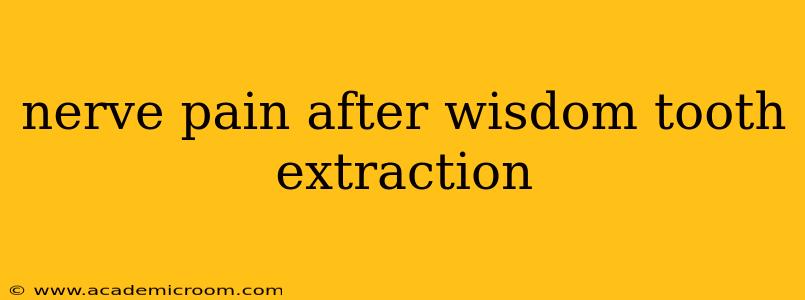Wisdom tooth extraction is a common procedure, but unfortunately, it can sometimes lead to nerve damage and persistent nerve pain. This can be a debilitating experience, significantly impacting your quality of life. Understanding the causes, potential treatments, and preventative measures is crucial for managing this complication. This comprehensive guide will explore everything you need to know about nerve pain after wisdom tooth extraction.
What Causes Nerve Pain After Wisdom Tooth Extraction?
The most common cause of nerve pain following a wisdom tooth extraction is iatrogenic nerve injury, meaning damage caused inadvertently during the surgical procedure. The inferior alveolar nerve (IAN), which provides sensation to the lower lip, chin, and teeth, runs close to the roots of the lower wisdom teeth. During extraction, especially if the tooth is impacted or deeply rooted, this nerve can be bruised, stretched, or even severed. The severity of the injury dictates the severity and duration of the pain. Other contributing factors include:
- Anatomical variations: The exact location and proximity of the IAN to the wisdom tooth roots vary from person to person. Some individuals have a nerve that lies exceptionally close to the tooth, increasing the risk of injury.
- Surgical technique: While experienced oral surgeons strive to minimize risks, there's always a possibility of unintended nerve injury during complex extractions. The use of excessive force or improper instrumentation can contribute to nerve damage.
- Infection: Post-operative infection can exacerbate any existing nerve irritation, leading to increased pain and discomfort.
- Inflammation: Swelling and inflammation in the area surrounding the extraction site can put pressure on the nerve, causing pain.
How Long Does Nerve Pain After Wisdom Tooth Extraction Last?
The duration of nerve pain varies significantly depending on the severity of the nerve injury. Minor nerve irritation may resolve within a few weeks, with symptoms gradually subsiding. However, more severe injuries can lead to persistent pain lasting for months or even years. This condition is known as persistent idiopathic neuralgia or neuropraxia. In some unfortunate cases, the damage might be permanent.
What Are the Symptoms of Nerve Damage After Wisdom Tooth Extraction?
Recognizing the symptoms is crucial for early intervention. Symptoms can include:
- Tingling: A pins-and-needles sensation in the lower lip, chin, or tongue.
- Numbness: Loss of feeling in the affected area.
- Sharp, shooting pain: Intense, sporadic pain radiating from the extraction site.
- Burning sensation: A persistent burning feeling in the lower lip, chin, or tongue.
- Weakness in the jaw muscles: Difficulty opening or closing the mouth completely.
What are the Treatment Options for Nerve Pain After Wisdom Tooth Extraction?
Treatment strategies depend on the severity and duration of the pain. Options include:
- Pain medication: Over-the-counter pain relievers (like ibuprofen or acetaminophen) or prescription medications (such as stronger analgesics or anti-convulsants) can help manage the pain.
- Corticosteroids: These medications can reduce inflammation and swelling around the nerve.
- Antidepressants: Certain antidepressants can help manage neuropathic pain, even if you don't experience depression.
- Physical therapy: Gentle exercises and massage may help stimulate nerve regeneration.
- Surgical intervention: In severe cases where conservative treatments fail, surgical intervention might be necessary. This could involve microsurgery to repair the nerve or alleviate pressure on it.
Can Nerve Pain After Wisdom Tooth Extraction Be Prevented?
While complete prevention isn't always guaranteed, several steps can help minimize the risk:
- Choosing an experienced oral surgeon: An experienced surgeon is more likely to have the necessary skills and precision to minimize the risk of nerve injury. Look for surgeons with extensive experience in wisdom tooth extractions.
- Thorough pre-operative assessment: This includes a detailed examination and potentially imaging studies (like a panoramic X-ray or CBCT scan) to accurately assess the position of the teeth and nerves.
- Following post-operative instructions: Adhering strictly to the oral surgeon's post-operative instructions, including medication and care of the extraction site, is crucial for healing.
What if my pain persists after several weeks?
If you experience persistent nerve pain after several weeks following your wisdom tooth extraction, it is crucial to seek immediate medical attention. Do not hesitate to contact your oral surgeon or dentist. Early diagnosis and treatment are key to maximizing the chances of a positive outcome. Delaying treatment can potentially lead to long-term complications.
Is nerve damage after wisdom tooth extraction permanent?
The permanence of nerve damage depends on the severity of the injury. Minor nerve injuries often heal completely within weeks or months. However, significant injuries might result in persistent numbness or pain that could last for an extended period or even become permanent in some cases. Regular follow-up with your oral surgeon is essential to monitor the recovery process.
This information is for general knowledge and does not constitute medical advice. Always consult with a qualified healthcare professional for diagnosis and treatment of any medical condition.
